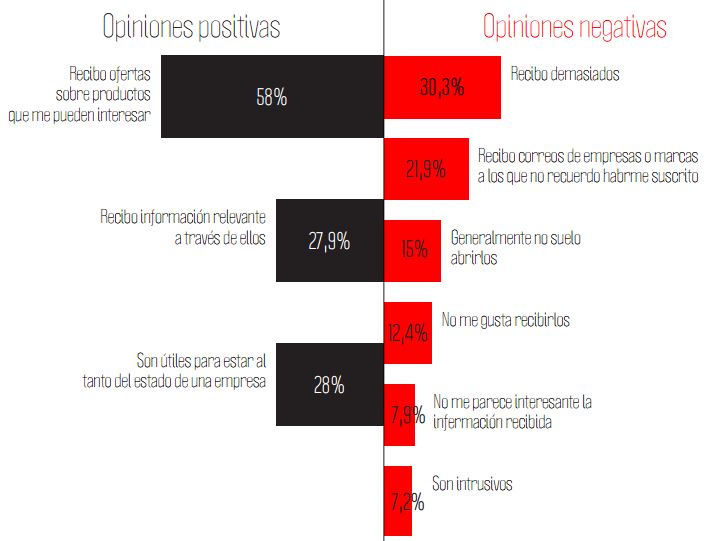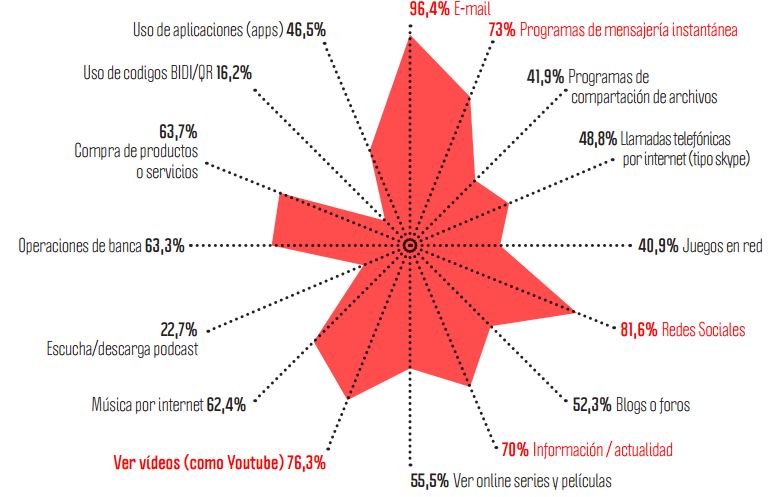The 4 big themes of email marketing in 2017

We can say that there are four major players shaping how email marketing is developing: consumers, marketers, technology providers and the legislator. In the following lines we want to summarise what, in our view, will be the big issues for each of these players in 2017.
CONSUMER
The consumer is, at the end of the day, who all other actors work for. So it makes sense to ask how consumers perceive and "use" the marketing they receive by email. In 2016, ADigital, together with Digital Response and other companies in the sector, published the "The consumer's perception and use of email marketing".Research on uses and perceptions of email marketing in Spain". The study covered two areas, one dedicated to the use that companies make of email marketing, and the other dedicated to the perception and assessment of consumers. In the latter section, the most relevant conclusions drawn were the following:
- E-mail is the most used internet service by users (96.4%), followed by the use of social networks (RRSS), the consumption of multimedia content, instant messaging services and the consumption of information/current media.

- 80% of users check their mail several times a day .
- 75% of users use more than one e-mail account.
- Users generally have a positive perception of email marketing.
- The aspects that favour the opening of e-mails are: that they contain offers on products, that the subject of the e-mail is direct and clear and not to saturate the user by sending them e-mails in an excessive way...

We see that the end consumer has a good perception of the advertising they receive by email, as long as it provides them with valuable content. We believe that in 2017 the customer's perception of email advertising will remain the same or even improve, mainly thanks to the efforts that marketers are making to make email marketing more personalised and relevant.
MARKETING PROFESSIONALS
The main challenge for email marketers is, as we noted earlier, to do our jobs better. This means taking advantage of the technological advances that the industry is making available to us (more on this later), and adopting a more "relational" approach to the way we do email marketing. Customer relationship management and email marketing campaign management platforms allow us to personalise content, segment and maintain a 1-to-1 "relationship" with each member of our database. The challenge is to dedicate time, effort and imagination to take advantage of all these functionalities at our fingertips. And the challenge is considerable. Back to the research we mentioned at the beginning. After surveying companies, some of the conclusions that were drawn were as follows:
- More than half of the companies surveyed do not carry out any testing prior to the launch of their email marketing campaigns.
- When it comes to analysing the level of email marketing expertise, almost half of the professionals surveyed stated that, in their company, the level was very basic.
- Mass mailings (newsletters and promotional emails) are the norm. Very few companies have "relational" programmes in place.

As such, we believe that the main challenge ahead for email marketing professionals is to take advantage of technological advances and make communication more personalised, relevant and aligned with the interests of each user..
TECHNOLOGY PROVIDERS
Recently Larry Ellison, founder of Oracle, said that the role of the Chief Marketing Officer (CMO) will become increasingly important in companies as a consequence of the strategic weight that brands are giving to the user experience.. This statement goes right to the heart of digital marketing. If this is so, and we believe it is, it is easy to understand why in the last two years Oracle has allocated 3 billion dollars to buy companies dedicated to marketing technology, including Responsys, a leader in email marketing and cross channel marketing. And it's not just Oracle that is betting big on this sector. Three years ago, Salesforce acquired ExactTarget, a company specialising in email marketing, and shortly before that it had acquired Radian6, a leading social media monitoring platform. Adobe closed the purchase of another company specialising in email marketing, the French company Neolane, and a couple of years ago the technology company IBM acquired the email marketing provider Silverpop. The big tech companies see clearly that the future of marketing will be to provide the best user experience with the brand, and in this the email channel is key.
Fine segmentation tools, algorithms that predict which product may be the most suitable for each user, at what time and through which channel it is optimal to communicate it or event triggers (for example, sending a highly personalised email) according to the user's behaviour, will be functionalities that email marketing professionals will have at our disposal to make the user experience better and better. The future points in this direction and we have to make the most of it.
LEGISLATOR
Most notable in this area, and will remain so in 2017 until it is clarified, is the liquidation of the "..." framework.Safe Harbor"The international data transfer agreement and the creation of a new "interim" agreement called Privacy Shield.
At the end of 2015, the Court of Justice of the European Union (CJEU) declared null and void the agreement known as "Safe Harbor", under which international data transfers could be made from the European Union to the United States. What is the situation if my email marketing provider is American? Most likely, they will host my customer data on their servers. Since then, the United States has been considered by the European authorities as a country that does not offer an adequate level of protection for personal data.What is to be done? Well, while a new EU regulation is being drafted, a series of conditions have been accepted so that the activity of European and North American companies that base part of their business model on the transfer and handling of user data is not halted; this is the so-called EU-US Privacy Shield or privacy shield between the United States and Europe. This new framework has aspects that we must be aware of and take into account until a definitive one emerges. As Email Marketing professionals we must be expectant and be aware of the implications that these regulatory changes have on our activity.